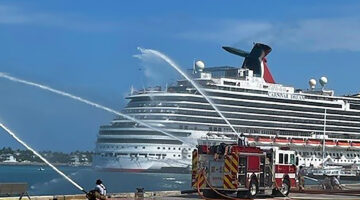Photographer Clyde Butcher finds freedom with digital camera
JENNIFER KAY, Associated Press
MIAMI (AP) — Clyde Butcher’s black-and-white landscape photography is known for evoking a feeling that America’s vistas are timeless even as development encroaches.
Images that Butcher has captured since last spring are infused with a new sense of freedom as well, after he made a dramatic shift from century-old photography techniques and equipment to a digital camera weighing less than 3 pounds.
“It’s just opened a whole world for me to shoot more,” Butcher said in a recent interview with The Associated Press at his new Miami gallery.
___
DIGITAL FOCUS
Butcher’s photographs of Florida’s Everglades, national parks and Cuba are celebrated for the tiny details that emerge clearly even from prints up to 9 feet across: the texture of bark, the veins of a leaf or the ripples within the shadow of a cloud over water.
For decades, Butcher lugged 65-pound box cameras, wide-angle lenses and negatives up to a foot wide on his wilderness treks. Once he planted his tripod, he would shoot just a handful of images.
The equipment’s weight and his own health problems caught up with Butcher last year. At 72, he has traded in the antique techniques he describes as essentially point-and-shoot for a light, compact, high-quality — but still essentially point-and-shoot — digital camera.
The trade-in gives him more flexibility while composing images, such as on a recent trip to Cayo Costa, near Fort Myers.
“I’ve got the textured log over me, and then I’ve got the water and great clouds and a great shadow underneath. I’m lying in the water and I couldn’t do that in large format,” he said.
___
CAPTURING A FEELING
While digital photography makes it easier for Butcher to shoot more, he still sticks to his routine of making just a handful of images at a time. He looks for angles and details such as a specific leaf or branch that will draw a viewer into the image.
Swamp walks led from Butcher’s main gallery in the Everglades are intended to give people a glimpse of what he sees through his camera.
“Once you’re in the water, there’s the feeling of primeval stuff,” he said.
Contrary to most Florida tour guides, Butcher insists the best time to experience the Everglades is the wet season, not the dry winter even when flocks of exotic birds are nesting here. (His verdict on bird photography: “Boring.”)
“Almost everything I’ve shot still exists. People used to be able to see it everywhere, now you have to go and see it. You have to get in the water, you have to get in a canoe. And best time to shoot unfortunately is in the summer,” he said.
___
CONSERVATION WOES
Butcher hopes his images inspire feelings of stewardship, but he’s pessimistic about the progress of conservation efforts in Florida.
The state Legislature and Gov. Rick Scott have ignored voters who approved a constitutional amendment that earmarked billions over the next 20 years to buy land for conservation, Butcher said.
A state budget passed last month included more than $400 million in tax cuts, including a small cut in taxes charged on cellphone and cable television bills. But the cuts don’t help the environment that makes Florida so attractive, Butcher said.
“We’re fighting a losing battle with Scott,” he said. “He’s saved $400 million from your cellphone taxes and some other stuff that doesn’t matter, and he won’t use the $400 million that’s supposed to be set aside for the environment. So he’s saved you $10 a year on your cellphone and sacrificed the environment. He just doesn’t understand Florida.”
[livemarket market_name="KONK Life LiveMarket" limit=3 category=“” show_signup=0 show_more=0]


No Comment